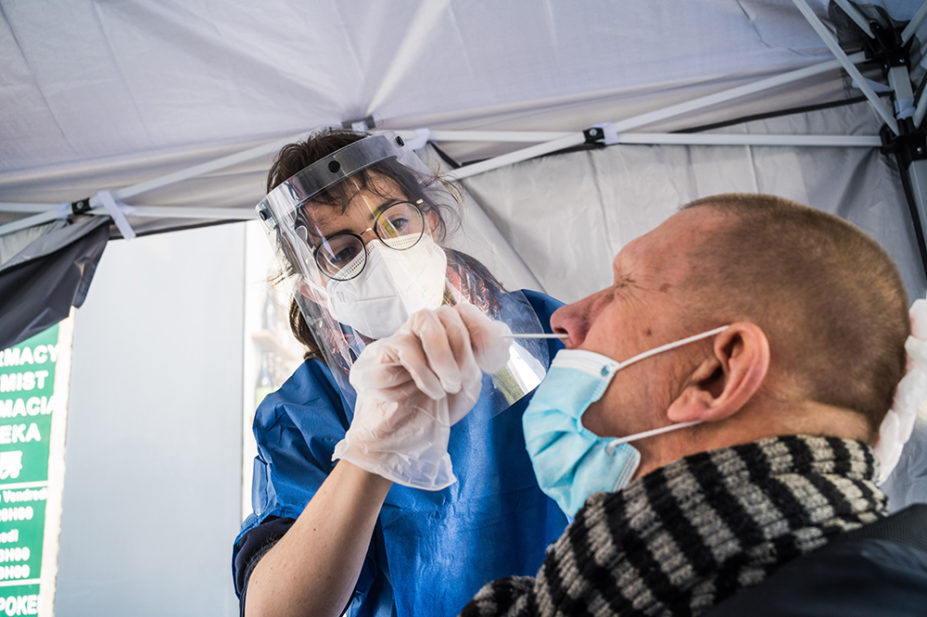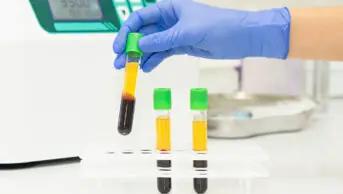
Science Photo Library
Open access article
The Royal Pharmaceutical Society has made this article free to access in order to help healthcare professionals stay informed about an issue of national importance.
To learn more about coronavirus, please visit: https://www.rpharms.com/resources/pharmacy-guides/wuhan-novel-coronavirus
Rapid point-of-care COVID-19 antigen tests can now be used in community pharmacies for patients with symptoms, Public Health England (PHE) has said in new guidance.
The guidance, published on 1 February 2021, supersedes earlier PHE advice, which said rapid point-of-care COVID-19 tests should not be used in community pharmacy, owing to a lack of information on their accuracy.
However, following a review, PHE has now said point-of-care or near-person tests, which provide results in around 30 minutes, “may be used within a healthcare setting such as a hospital, a general practice or a pharmacy, or in other settings such as a residential care home, a school, or in a person’s home”.
Any test used in pharmacies “must have a valid CE mark to ensure its design and manufacture achieves the performance specified for its purpose and is safe to use”, the guidance said.
The ‘Summary guidance for service providers on rapid point of care (near-person) tests for diagnosis and management’ notes that four lateral flow antigen tests have now been “shown to have a sensitivity of over 70% of all RT-PCR [reverse transcription polymerase chain reaction] positives and, critically, these tests detected almost all (over 95%) with high viral loads”.
However, it adds that lateral flow antigen testing of asymptomatic patients in England revealed that test sensitivity in some samples in a large-scale testing programme in Liverpool “was 40% when compared to RT-PCR”.
However, the lateral flow antigen testing did identify “two-thirds of persons” with higher viral loads in the same study, it said.
As a result, lateral flow antigen testing of asymptomatic patients and lateral flow antibody testing are still not recommended, “unless as a formal part of one of the programmes or pilot studies within the National Testing Programme”.
“Should a [lateral flow] antibody POC/NP [point-of-care/near-person] test result, whether positive or negative, be influencing the clinical management of an individual patient’s symptoms, it is essential that a more reliable laboratory ELISA [enzyme-linked immunosorbent assay] antibody test is performed,” the guidance said.
Claire Anderson, chair of the English Pharmacy Board, said: “We welcome the inclusion of pharmacy premises as a healthcare setting where a COVID-19 point-of-care or near-person test, with a valid CE mark, may be used.”
“Pharmacists can provide the essential advice and support required to use and interpret tests appropriately, ensuring that the public are aware of what steps they need to take following their result,” she said.
As of December 2020, all private coronavirus test providers must “be engaged with the United Kingdom Accreditation Service (UKAS), and to have achieved UKAS accreditation for coronavirus testing”.
The list of ten requirements needed for accreditation include the need for a clinical or medical director, or equivalent, and healthcare scientist; a CE-marked test; and results being reported to PHE.
Some 373 providers are currently listed as approved private providers of COVID-19 tests with UKAS accreditation, including LloydsPharmacy and Boots.
A spokesperson for the General Pharmaceutical Council (GPhC), which previously warned pharmacies against providing rapid point-of-care antibody tests, said it was “carefully reviewing the PHE guidance and the implications for community pharmacies, recognising that there continue to be important distinctions between the issues around antigen testing on the one hand and antibody testing on the other”.
“As highlighted in the PHE guidance, it is essential that all pharmacies that are providing COVID-19 testing become accredited. UKAS has provided comprehensive FAQs for private providers that give further details about how to go about becoming accredited, and what minimum standards are expected in order to be accredited.
“We strongly recommend that before considering offering testing, you should consult this document and the information on their website. If you are already providing testing services, it is essential that you start the process of accreditation imminently,” they said.


